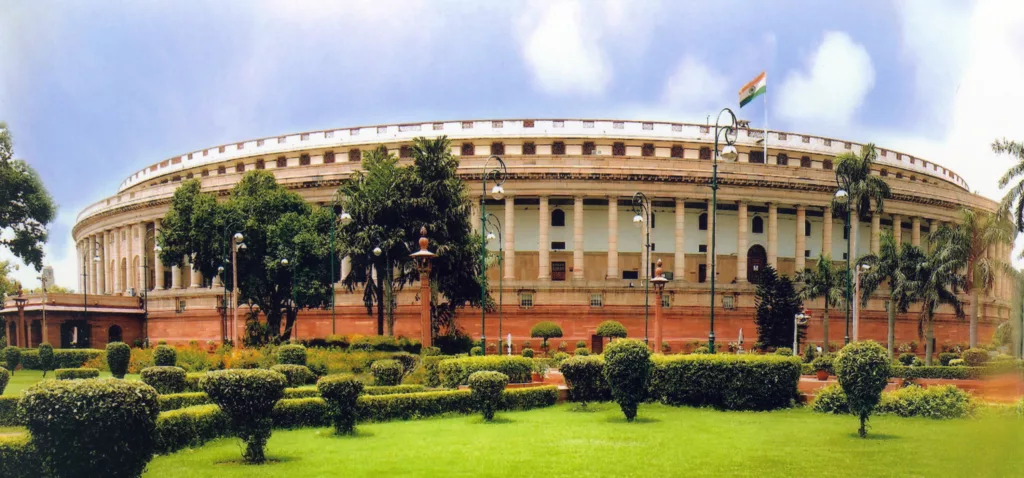The Waqf Bill, which has stirred significant debate, passed smoothly through both the Lok Sabha and Rajya Sabha, with the latter approving it by 128 votes in favour and 95 against.

The Bill, which amends the Waqf Act of 1995, has brought to the forefront sharp differences of opinion between the ruling government and the opposition, particularly over certain contentious provisions.
The debate in the Rajya Sabha, which lasted for several hours, revealed some divisions among opposition parties as well.
The Biju Janata Dal, led by Naveen Patnaik, decided to allow a “conscience vote” for its seven MPs in the Rajya Sabha, meaning they could vote according to their individual views. This move came after the party considered the sentiments of various sections of the minority communities regarding the Waqf Bill.
Senior BJD leader Sasmit Patra explained that the party’s decision was based on the diverse opinions within the community.
The debate on the Waqf Bill largely followed expected lines, with the government defending the proposed changes and the opposition raising concerns about the potential negative impact on the Muslim community.
#WATCH | Aligarh, UP | Mohammad Amir Rashid, President of Dara Shikoh Foundation says, "The Waqf (Amendment) Bill, 2025 has been passed in the Rajya Sabha and the poor and Pasmanda Muslims are very happy… The Waqf (Amendment) Bill, 2025 has brought a new ray of hope… We burst… https://t.co/lLTTHxj15E pic.twitter.com/IFi0Faqu9F
— ANI (@ANI) April 4, 2025
Union Minister Kiren Rijiju, speaking in favour of the Bill, dismissed claims that the legislation would harm Muslim interests. He argued that the Bill is focused on property management and corruption prevention, not religious interference.
One of the key changes proposed in the Bill is that proof of ownership will now be required before a property can be declared as Waqf, which Rijiju said would prevent the automatic declaration of properties as Waqf simply based on the Board’s claim.
He also listed some of the properties that were previously labelled as Waqf, such as land in Lutyens’ Delhi and even a 400-year-old temple in Tamil Nadu, to highlight the importance of the amendments.
Congress leader Syed Naseer Hussain, however, criticized the government’s argument, particularly focusing on the properties being discussed. He pointed out that many of these properties were either mosques, burial grounds, or dargahs and were handed over to the Waqf by the British during their rule.
He also questioned the government’s claim that no one could move court under the existing Waqf Act, pointing out that numerous cases are still pending in the High Court and Supreme Court, suggesting that people do have the right to challenge decisions.
#WATCH | Delhi: On Waqf Amendment Bill, Rajya Sabha MP Kapil Sibal says, "What has their politics since 2014 been? They talk about Love Jihad, flood jihad, 'thook' jihad, and the UCC… Their modus operandi is to keep the Muslim issue burning for their political gains… The 1995… pic.twitter.com/4qr9IoFN1w
— ANI (@ANI) April 3, 2025
Union Minister Amit Shah, in his response, clarified that the 2013 Waqf Act only allowed limited writ jurisdiction, which restricted the scope for legal challenges. He also accused the opposition of attempting to distract from the core issues, such as addressing the needs of the deprived sections of the Muslim community.
In contrast, Congress leader Mallikarjun Kharge argued that the Bill should not be turned into a prestige issue, warning that its passage could lead to disputes across the country.
He also pointed out that the Bill passed with a narrow margin in the Lok Sabha, suggesting that there were significant reservations about it. Kharge called for the government to reconsider the Bill and address its potential flaws.
One of the most contentious provisions in the Waqf Bill is the proposal to include two non-Muslim members in the Central Waqf Council and Waqf Boards. This has raised concerns within the opposition, with some questioning the logic behind including non-Muslims in an institution that manages Muslim religious properties.
AIMIM leader Imtiaz Jaleel questioned the fairness of allowing non-Muslims to be part of the Waqf Board when no non-Muslims are included in boards for other religious communities, such as the Ram Temple Trust or the Tirupati Temple Trust.
Another provision that has sparked debate is the restriction that only individuals who have practiced Islam for at least five years can donate properties to the Waqf. This has raised questions about how the government will determine who qualifies as a practicing Muslim and whether this infringes on the right to practice religion freely. Critics also argue that this provision could unfairly discriminate against converts.
The Bill also proposes that government properties identified as Waqf will no longer belong to the board, with the local Collector having the final say on ownership disputes.
The opposition has expressed concern that this provision could give the government more control over Waqf properties, which could lead to disputes and possible misuse of power. Under the new provisions, decisions that were previously made by Waqf tribunals will now be decided by senior government officers, further raising fears of government interference.
While the government defends the amendments as necessary for transparency and to curb corruption, the opposition sees them as a move to take control over Waqf properties, undermining the independence of religious institutions.
The Bill will now be sent for the President’s approval, and its future will depend on how these contentious provisions are received by various stakeholders, especially the Muslim community, who feel most affected by the changes.


